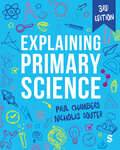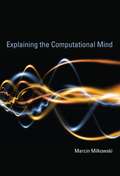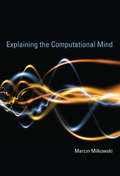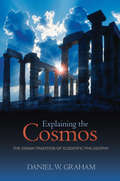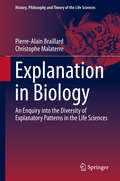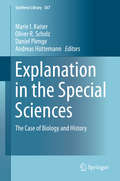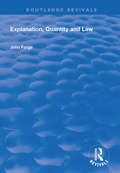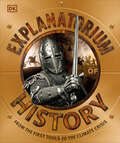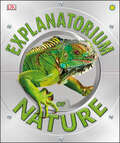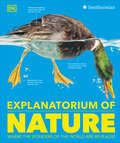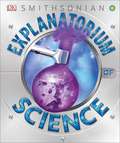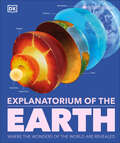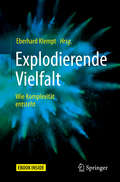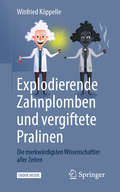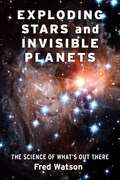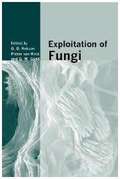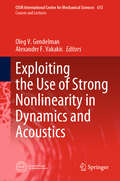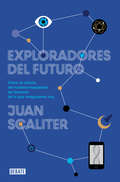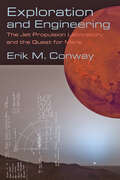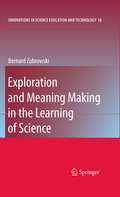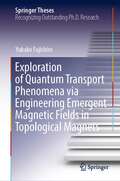- Table View
- List View
Explaining Primary Science
by Paul Chambers Nicholas SouterSuccessful science teaching in primary schools requires a careful understanding of key scientific knowledge. This book covers all the major areas of science relevant for beginning primary school teachers, explaining key concepts from the ground up, helping trainees and recently qualified teachers develop into confident science educators. This new edition comes with: An exploration of scientific misconceptions on key topics How to take action to protect the environment through primary science teaching A newly streamlined focus prioritising essential primary school subject knowledge Links to national curricula for England and Scotland Videos of useful science experiments and demonstrations for the primary classroom
Explaining Primary Science
by Paul Chambers Nicholas SouterSuccessful science teaching in primary schools requires a careful understanding of key scientific knowledge. This book covers all the major areas of science relevant for beginning primary school teachers, explaining key concepts from the ground up, helping trainees and recently qualified teachers develop into confident science educators. This new edition comes with: An exploration of scientific misconceptions on key topics How to take action to protect the environment through primary science teaching A newly streamlined focus prioritising essential primary school subject knowledge Links to national curricula for England and Scotland Videos of useful science experiments and demonstrations for the primary classroom
Explaining the Computational Mind
by Marcin MilkowskiIn this book, Marcin Milkowski argues that the mind can be explained computationally because it is itself computational -- whether it engages in mental arithmetic, parses natural language, or processes the auditory signals that allow us to experience music. Defending the computational explanation against objections to it -- from John Searle and Hilary Putnam in particular -- Milkowski writes that computationalism is here to stay but is not what many have taken it to be. It does not, for example, rely on a Cartesian gulf between software and hardware, or mind and brain. Milkowski's mechanistic construal of computation allows him to show that no purely computational explanation of a physical process will ever be complete. Computationalism is only plausible, he argues, if you also accept explanatory pluralism. Milkowski sketches a mechanistic theory of implementation of computation against a background of extant conceptions, describing four dissimilar computational models of cognition. He reviews other philosophical accounts of implementation and computational explanation and defends a notion of representation that is compatible with his mechanistic account and adequate vis à vis the four models discussed earlier. Instead of arguing that there is no computation without representation, he inverts the slogan and shows that there is no representation without computation -- but explains that representation goes beyond purely computational considerations. Milkowski's arguments succeed in vindicating computational explanation in a novel way by relying on mechanistic theory of science and interventionist theory of causation.
Explaining the Computational Mind
by Marcin MilkowskiA defense of the computational explanation of cognition that relies on mechanistic philosophy of science and advocates for explanatory pluralism. In this book, Marcin Milkowski argues that the mind can be explained computationally because it is itself computational—whether it engages in mental arithmetic, parses natural language, or processes the auditory signals that allow us to experience music. Defending the computational explanation against objections to it—from John Searle and Hilary Putnam in particular—Milkowski writes that computationalism is here to stay but is not what many have taken it to be. It does not, for example, rely on a Cartesian gulf between software and hardware, or mind and brain. Milkowski's mechanistic construal of computation allows him to show that no purely computational explanation of a physical process will ever be complete. Computationalism is only plausible, he argues, if you also accept explanatory pluralism.Milkowski sketches a mechanistic theory of implementation of computation against a background of extant conceptions, describing four dissimilar computational models of cognition. He reviews other philosophical accounts of implementation and computational explanation and defends a notion of representation that is compatible with his mechanistic account and adequate vis à vis the four models discussed earlier. Instead of arguing that there is no computation without representation, he inverts the slogan and shows that there is no representation without computation—but explains that representation goes beyond purely computational considerations. Milkowski's arguments succeed in vindicating computational explanation in a novel way by relying on mechanistic theory of science and interventionist theory of causation.
Explaining the Cosmos: The Ionian Tradition of Scientific Philosophy
by Daniel W. GrahamExplaining the Cosmos is a major reinterpretation of Greek scientific thought before Socrates. Focusing on the scientific tradition of philosophy, Daniel Graham argues that Presocratic philosophy is not a mere patchwork of different schools and styles of thought. Rather, there is a discernible and unified Ionian tradition that dominates Presocratic debates. Graham rejects the common interpretation of the early Ionians as "material monists" and also the view of the later Ionians as desperately trying to save scientific philosophy from Parmenides' criticisms. In Graham's view, Parmenides plays a constructive role in shaping the scientific debates of the fifth century BC. Accordingly, the history of Presocratic philosophy can be seen not as a series of dialectical failures, but rather as a series of theoretical advances that led to empirical discoveries. Indeed, the Ionian tradition can be seen as the origin of the scientific conception of the world that we still hold today.
Explanation in Biology
by Pierre-Alain Braillard Christophe MalaterrePatterns of explanation in biology have long been recognized as different from those deployed in other scientific disciplines, especially that of physics. Celebrating the diversity of interpretative models found in biology, this volume details their varying types as well as explaining their relationships to one another. It covers the key differentials with other sciences in the nature of explanation, such as the existence in biology of varieties unheard of in the physical sciences, such as teleological, evolutionary and even functional explanations. Offering a wealth of fresh analysis of the phenomenon, chapters examine aspects ranging from the role of mathematics in explaining cell development to the complexities thrown up by evolutionary-developmental biology, where explanation is altered by multidisciplinarity itself. They cover major domains such as ecology and systems biology, as well as contemporary trends, such as the mechanistic explanations spawned by progress in molecular biology. With contributions from researchers of many different nationalities, the book provides a many-angled perspective on a revealing feature of the discipline of biology.
Explanation in the Special Sciences
by Andreas Hüttemann Marie I. Kaiser Oliver R. Scholz Daniel PlengeBiology and history are often viewed as closely related disciplines, with biology informed by history, especially in its task of charting our evolutionary past. Maximizing the opportunities for cross-fertilization in these two fields requires an accurate reckoning of their commonalities and differences--precisely what this volume sets out to achieve. Specially commissioned essays by a team of recognized international researchers cover the full panoply of topics in these fields and include notable contributions on the correlativity of evolutionary and historical explanations, applying to history the latest causal-mechanical approach in the philosophy of biology, and the question of generalized laws that might pertain across the two subjects. The collection opens with a vital interrogation of general issues on explanation that apart from potentially fruitful areas of interaction (could the etiology of the causal-mechanical perspective in biology account for the historical trajectory of the Roman Empire?) this volume also seeks to chart relative certainties distinguishing explanations in biology and history. It also assesses techniques such as the use of probabilities in biological reconstruction, deployed to overcome the inevitable gaps in physical evidence on early evolution. Methodologies such as causal graphs and semantic explanation receive in-depth analysis. Contributions from a host of prominent and widely read philosophers ensure that this new volume has the stature of a major addition to the literature.
Explanation in the Special Sciences: The Case of Biology and History (Synthese Library #367)
by Andreas Hüttemann Marie I. Kaiser Oliver R. Scholz Daniel PlengeBiology and history are often viewed as closely related disciplines, with biology informed by history, especially in its task of charting our evolutionary past. Maximizing the opportunities for cross-fertilization in these two fields requires an accurate reckoning of their commonalities and differences—precisely what this volume sets out to achieve. Specially commissioned essays by a team of recognized international researchers cover the full panoply of topics in these fields and include notable contributions on the correlativity of evolutionary and historical explanations, applying to history the latest causal-mechanical approach in the philosophy of biology, and the question of generalized laws that might pertain across the two subjects. The collection opens with a vital interrogation of general issues on explanation that apart from potentially fruitful areas of interaction (could the etiology of the causal-mechanical perspective in biology account for the historical trajectory of the Roman Empire?) this volume also seeks to chart relative certainties distinguishing explanations in biology and history. It also assesses techniques such as the use of probabilities in biological reconstruction, deployed to overcome the inevitable gaps in physical evidence on early evolution. Methodologies such as causal graphs and semantic explanation receive in-depth analysis. Contributions from a host of prominent and widely read philosophers ensure that this new volume has the stature of a major addition to the literature.
Explanation, Quantity and Law (Routledge Revivals)
by John ForgePublished in 1999, this work sets out to give an account of explanation which is adequate to the problems that arise when looking at physical science. It offers a theory of explanation with supporting analysis, and also an application to the task of giving an account of explanation in quantum mechanics.
Explanatorium of History: From the First Tools to the Climate Crisis (DK Explanatorium)
by DKDiscover the story of &“us&” — from the dawn of human history up to the world we live in today.This visually stunning history encyclopedia for children takes you on an epic fact-packed journey through the past. Explore historical events through vivid illustrations and engaging explanations.Inside the pages of this fascinating history book for kids ages 10-14, you&’ll find: • Gorgeous images of objects, paintings and landscapes that bring history to life. • In-depth information using targeted captions and annotation. • Supporting artwork panels allow for a deeper understanding. • Comprehensive historical reference. Welcome to the SI Explanatorium. Take a look inside to reveal how history works! From the evolution and migrations of early humans to the rise and fall of great empires like Ancient Rome and the Aztecs, this history reference book shows you the major turning points in history.Get the inside track on wars and conflict, including European knights, Japanese samurai, Inca warriors and the major clashes of World War I, World War II, the Cold War, the War on Terror and so much more. It&’s the perfect children&’s visual encyclopedia for young history buffs.There are more SI Explanatoriums to explore! Get closer to nature than you&’ve ever been before with SI Explanatorium of Nature and see the world of science come to life with SI Explanatorium of Science.
Explanatorium of Nature (DK Explanatorium)
by DKGet closer to nature than you&’ve ever been before with this jaw-dropping guide to our wonderful world. Marvel at the breathtaking photography showcasing flora and fauna in the most incredible, intricate detail. From ants to elephants, the animal kingdom is explored and explained in this extraordinary encyclopedia that puts you at the heart of the action. See the tiny spines on a stinging nettle, watch lichen spreading over a tree, and observe the secret suckers on an iguana&’s feet. The mysteries of the natural world are displayed in brand new images, together with cross-sections, macro, and electron microscope images. Alongside the utterly absorbing visual content, Explanatorium of Nature brings its own fountain of knowledge about how nature works. For instance, did you know baby foxes that are born with blue eyes turn to gold? Or that reptile scales are made from the same material as your fingernails? Discover how spiders spin webs, how birds fly, how snakes kill, and much, much more. This irresistible book is a guaranteed favorite for animal lovers, nature enthusiasts, and budding wildlife experts everywhere.
Explanatorium of Nature: Where the Wonders of the World are Revealed (DK Explanatorium)
by DKGet closer to nature than you’ve ever been before with this jaw-dropping guide to our wonderful world. Marvel at the breathtaking photography showcasing flora and fauna in the most incredible, intricate detail. From ants to elephants, the animal kingdom is explored and explained in this extraordinary encyclopedia that puts you at the heart of the action. See the tiny spines on a stinging nettle, watch lichen spreading over a tree, and observe the secret suckers on an iguana’s feet. The mysteries of the natural world are displayed in brand new images, together with cross-sections, macro, and electron microscope images. Alongside the utterly absorbing visual content, Explanatorium of Nature brings its own fountain of knowledge about how nature works. For instance, did you know baby foxes that are born with blue eyes turn to gold? Or that reptile scales are made from the same material as your fingernails? Discover how spiders spin webs, how birds fly, how snakes kill, and much, much more. This irresistible book is a guaranteed favorite for animal lovers, nature enthusiasts, and budding wildlife experts everywhere.
Explanatorium of Science
by Smithsonian Institution DkOpen up this book to reveal how science really works! Watch as mixtures merge and matter changes state. Discover how some chemical changes can be reversed, yet others can't, and why some reactions produce a bang! See bacteria at work in the world around us, and even inside the human digestive system. Understand the tricks that light plays and unlock the secrets of electricity to find out how it powers your home.
Explanatorium of the Earth (DK Explanatorium)
by DKWelcome to the Explanatorium of the Earth - the only Earth encyclopedia for children you'll ever need, with amazing photographs of everything from supervolcanoes to tsunamis.What makes volcanoes erupt? Why are tornadoes and hurricanes so destructive? How do rocks, fossils, and gems form? Explanatorium of the Earth takes you on an incredible voyage deep into the heart of our planet and back to discover the powerful forces that continually shape and remodel our ever-changing world. Discover how tectonic plates tear apart and collide, moving inch by inch to create continents, mountain ranges, oceans, and volcanoes. Witness the destructive power of earthquakes, tsunamis, and hurricanes. Learn how the slow but relentless process of erosion and weathering wear away rock, reducing mountains to dust and carving valleys and canyons into the land. And learn how the living world and rock cycles have worked together for millions of years to stabilize the planet's climate, keeping Earth suitable for life.
Explanatory Pluralism
by C. MantzavinosExplaining phenomena is one of the main activities in which scientists engage. This book proposes a new philosophical theory of scientific explanation by developing and defending the position of explanatory pluralism with the help of the notion of 'explanatory games'. Mantzavinos provides a descriptive account of the explanatory activity of scientists in different domains and shows how they differ from commonsensical explanations offered in everyday life by ordinary people and also from explanations offered in religious contexts. He also shows how an evaluation and a critical appraisal of explanations put forward in different social arenas can take place on the basis of different values. Explanatory Pluralism provides solutions to all important descriptive and normative problems of the philosophical theory of explanation as illustrated in sophisticated case studies from economics and medicine, but also from mythology and religion.
Explodierende Vielfalt: Wie Komplexität entsteht
by Eberhard KlemptVerstehen wir die Welt? Wie ist unsere Welt entstanden? Warum gibt es so viel Materie und so wenig Antimaterie? Wie bildeten sich die weiträumigen Strukturen in unserem Universum? Und wie entstanden aus der unbelebten Materie die ersten reproduktionsfähigen Lebewesen? Welcher Anpassungsdruck erzeugte die Artenvielfalt und letztlich die Hominiden? Wie entwickelten sich Bewusstsein, Kreativität, Religion? In dem vorliegenden Buch beantworten herausragende Wissenschaftler diese und viele weitere spannende Fragen und erklären, wie aus einfachen Anfängen und simplen Regeln immer wieder komplizierte Strukturen entstanden sind. Diese sogenannte Selbstorganisation wird an Beispielen aus den verschiedensten Disziplinen demonstriert – sei es bei der Geburt des Universums, auf der Ebene der Quarks und der Atome, bei der Entstehung des Lebens und bei seiner Ausdifferenzierung in die Vielzahl der Lebensformen bis hin zum Menschen selbst, mit seinen kulturell und wissenschaftlich immer höher entwickelten Gesellschaften. Interessierte Leser können mit Hilfe dieses Buches nachvollziehen, mit welchen Erkenntnissen und Thesen die Wissenschaft heute erklärt, wie die Natur mit einfachen Grundbausteinen und Gesetzen solch komplexe Gefüge geschaffen hat.
Explodierende Zahnplomben und vergiftete Pralinen: Die merkwürdigsten Wissenschaftler aller Zeiten
by Winfried KöppelleEin schottischer Genetiker begeistert sich für Sauerstoffentzug und Stickstoffvergiftungen, pustet sich Zigarrenrauch durchs perforierte Trommelfell und steckt die eigene Gattin in seine Unterdruckkammer.Eine inselbegabte Autistin kriecht auf allen Vieren durch Schlachthöfe, entspannt sich in ihrer selbsterfundenen „Presskiste“, und steigt zur führenden Expertin für humanes Metzgerhandwerk auf.Ein Selfmade-Chemiker rottet mit seinen Erfindungen beinahe die Menschheit aus – und erwürgt sich mit einer seiner Konstruktionen versehentlich selbst.Ein Anthropologie-Professor fabriziert an der Uni illegale Drogen und wandert hinter Gitter. Nach seiner Entlassung schickt er seinem Richter vergiftete Pralinen – und bekommt lebenslänglich.Wer schon immer vermutete, dass intelligente Menschen oft auch sehr eigenartige Zeitgenossen sind – hier der Beweis: Zehn Kurzbiografien zwischen Genie und Wahnsinn – zehnmal Unerhörtes, Sagenhaftes, Haarsträubendes und Skandalöses aus der elitären Welt der Spitzenforschung.
Exploding Stars and Invisible Planets: The Science of What's Out There
by Fred WatsonWhat happens to space and matter near a black hole? Where did the moon come from? How do we know what stars are made of? Are we alone in the universe?In Exploding Stars and Invisible Planets, Fred Watson, an award-winning astronomer, presents the most up-to-date knowledge on hot topics in astronomy and space science, providing a fascinating and entertaining account of the latest research. Watson explains how to find invisible planets around other stars, why dark matter matters, and the future of citizen space travel, all while recounting the seismic shifts in understanding that have taken place during his illustrious career.The book features illuminating discussions of microbes in space; the dividing line between day and night; exploding stars and light echoes; fast radio bursts and signals from space; meteors, meteorites, and space dust; what happened to the Martian ocean; the seas and lakes of Titan; and the birth of the universe.
Exploitation of Fungi: Symposium of the British Mycological Society Held at the University of Manchester September 2005
by G. D. Robson G. M. GaddThe fungi are a highly diverse kingdom of eukaryotic microbes. Recent advances in molecular genetics, together with the release of whole genome sequences of an increasing number of fungi, are facilitating their exploitation and commercialisation. Fungi have the ability to secrete large quantities of proteins of commercial value, and their complex secondary metabolic pathways produce a diverse range of bioactive compounds which have had a major impact in the pharmaceuticals market. In addition, the fungi themselves are increasingly being developed as alternatives to conventional chemically-based pest control strategies, and as bioremediation agents capable of transforming pollutants in the soil environment. With chapters written by international experts, this volume highlights current and future biological, biochemical, and molecular exploitation of the fungi in biotechnology. It will have broad appeal, not only to mycologists and microbiologists, but also to biomedical scientists, biotechnologists, environmental and molecular scientists, plant pathologists and geneticists.
Exploiting the Use of Strong Nonlinearity in Dynamics and Acoustics (CISM International Centre for Mechanical Sciences #613)
by Oleg V. Gendelman Alexander F. VakakisThis book covers the latest ideas and approaches in strongly nonlinear dynamical and acoustical systems and discusses appropriate modelling tools and practical examples highlighting the non-standard and non-stationary aspects of this challenging, yet so promising area. The contributions investigate and present the intentional use of nonlinearity in the most challenging field of acoustics, the latest developments in transient dynamics of strongly nonlinear systems, the subtle numeric problems arising while exploring nonlinear normal modes, the fascinating topic of nonlinear dynamics of wind musical instruments, the novel developments in the field of global nonlinear dynamics, some multi-faceted mathematical challenges in the dynamics of hysteretic systems, and lastly offers theoretical, numeric and experimental insights into the intricate dynamics of systems with contact nonlinearities. The need for such a work is underscored by the fact that accounting for, understanding of, and designing with nonlinearities is becoming an emerging universal trend in engineering practice, and is predicted to be even more so in the future. The book demonstrates that the idea of exploiting strong nonlinearity in dynamical and acoustical systems has transitioned from few early theoretical works to a diverse theoretical and experimental body of current research.
Exploradores del futuro: Como la ciencia del mañana traspasará las barreras de lo que imaginamos hoy
by Juan ScaliterLos avances científicos se suceden a un ritmo desorbitado debido a la simbiosis entre ciencia y tecnología.Una semana de lectura de un periódico serio aporta más conocimiento del que una persona del siglo XVIII podría abarcar a lo largo de toda su vida. En solo tres años un ordenador equiparará la capacidad de procesamiento del cerebro humano, y en el 2049 la capacidad de toda la población del planeta. La información nueva sobre ciencia y tecnología que se generará este último año superará a la de los últimos 5.000 años. Estas son algunas de las premisas que nos presenta Juan Scáliter. El progreso es indudablemente positivo, pero puede ser fuente de muchos problemas si no sabemos cómo adaptarnos. El autor propone cambios drásticos para el desarrollo adecuado de nuestra especie y nos explica cuáles son las estrategias viables y necesarias para poder optimizar todos estos cambios y convertirnos en arquitectos de nuestro futuro.
Exploration and Engineering: The Jet Propulsion Laboratory and the Quest for Mars (New Series in NASA History)
by Erik M. ConwayGetting to Mars required engineering genius, scientific strategy, and the drive to persevere in the face of failure.Although the Jet Propulsion Laboratory in Pasadena, California, has become synonymous with the United States’ planetary exploration during the past half century, its most recent focus has been on Mars. Beginning in the 1990s and continuing through the Mars Phoenix mission of 2007, JPL led the way in engineering an impressive, rapidly evolving succession of Mars orbiters and landers, including roving robotic vehicles whose successful deployment onto the Martian surface posed some of the most complicated technical problems in space flight history.In Exploration and Engineering, Erik M. Conway reveals how JPL engineers’ creative technological feats led to major breakthroughs in Mars exploration. He takes readers into the heart of the lab’s problem-solving approach and management structure, where talented scientists grappled with technical challenges while also coping, not always successfully, with funding shortfalls, unrealistic schedules, and managerial turmoil.Conway, JPL’s historian, offers an insider’s perspective into the changing goals of Mars exploration, the ways in which sophisticated computer simulations drove the design process, and the remarkable evolution of landing technologies over a thirty-year period.
Exploration and Meaning Making in the Learning of Science
by Bernard ZubrowskiThis book provides a broad and deep rationale for various pedagogical practices associated with the teaching of science. The main thesis of this book is that the exploratory phase of scientific inquiry is undervalued and its purpose misunderstood. Furthermore, there is a need for an expanded conception or alternative way of thinking about the so called learning cycle that has been frequently cited as the pedagogical model for a fair number of curriculum programs. A pedagogical model is proposed that recognizes learning cycles as ones that build on each other in an in-depth developmental manner. It presents an alternative paradigm that gives more attention to the motivation of students and assigns an essential role for student input. The overall goal is to move the reader to think more holistically about the practice of science education. This original and unorthodox book summarizes the author's present thinking about curriculum design and direct work with students. The author draws upon his varied experiences to present a case for the importance of direct engagement with phenomena and materials. He argues that this practice is more than a matter of motivating students to become engaged in inquiry. The first four chapters lay out different levels of a pedagogical approach and an overall theoretical orientation. The middle chapters focus on what might be called sensory knowledge. These are concerned with the role of different sensory engagement, movement as related to gestural representation and the role of empathy in exploration. The last four chapters are about the role of aesthetic, play, variable exploration and metaphor in their shaping of science education experiences. Each chapter is introduced with a scenario or case study describing the behavior and talk of elementary or middle school students. The intention of these scenarios is to help the reader stay grounded while considering the more abstract development of research reports and broader philosophical issues.
Exploration of Quantum Transport Phenomena via Engineering Emergent Magnetic Fields in Topological Magnets (Springer Theses)
by Yukako FujishiroThis book addresses novel electronic and thermoelectronic properties arising from topological spin textures as well as topologically non-trivial electronic structures. In particular, it focuses on a unique topological spin texture, i.e., spin hedgehog lattice, emerging in a chiral magnet and explore its novel properties which are distinct from the conventional skyrmion lattice, and discusses the possibility of realizing high-temperature quantum anomalous Hall effect through quantum confinement effect in topological semimetal. This book benefits students and researchers working in the field of condensed matter physics, through providing comprehensive understanding of the current status and the outlook in the field of topological magnets.
